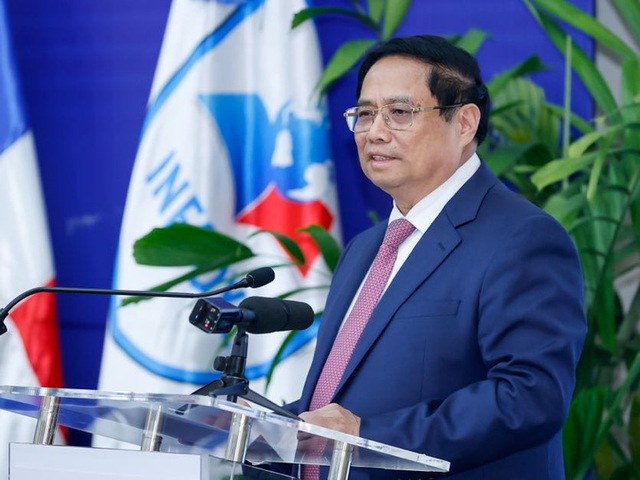Prime Minister delivers policy speech at INESDYC in Dominican Republic
VGP - Prime Minister Pham Minh Chinh on Thursday delivered a policy speech at the Institute of Higher Education in Diplomatic and Consular Training (INESDYC), as part of his official visit to the Latin American country.

Prime Minister Pham Minh Chinh delivers a policy speech at the Institute of Higher Education in Diplomatic and Consular Training (INESDYC), the Dominican Republic, November 21, 2024 - Photo: VGP/Nhat Bac
Pham said that although Viet Nam and the Dominican Republic are half a world apart, they share a lot of similarities and complement each other.
They have strategic positions in each region; economies that complement and promote each other; rich, diverse, and unique cultures; similar ideals.
The future of the world is being increasingly shaped by five key trends in today's new era of connectivity, deep integration, smart technology, and innovation, he added.
These key factors include the rapid advancement of science and technology, driven by the Fourth Industrial Revolution, which is already reshaping the global landscape; negative impacts of non-traditional security challenges such as climate change, resource depletion, population aging, natural disasters, food and water security, cyber threats, and transnational crimes; the rise in global fragmentation, division, and polarisation fueled by geo-strategic and geo-economic competitions; the development of the digital, green, circular, knowledge, and sharing economies; and the critical development of high-quality human resources in fields like science and technology, innovation, AI, cloud computing, and the Internet of Things (IoT).
He underlined the importance of a new, inclusive, and comprehensive approach on a global-level scale to address these challenges.
It is vital for nations to work together to create an international order based on rules, promote multilateralism, and international law.
This is not only a responsibility but also a key opportunity for every nation, particularly developing countries like Viet Nam and the Dominican Republic.
Pham told the participants that after nearly 40 years of Doi Moi (Renewal), from a country under siege and embargo, Viet Nam has established diplomatic relations with 194 countries; is an active member of more than 70 international organizations; and has signed 17 free trade agreements involving more than 60 leading economies in the world.
From a poor, backward, and war-torn country, it has become a middle-income developing country, belonging to the group of 34 largest economies in the world and the group of 20 leading economies in terms of trade with import-export turnover expected to reach about US$800 billion in 2024.
Viet Nam is also at the forefront of successfully implementing many Sustainable Development Goals (SDGs), increasingly proactively contributing to common global concerns, including efforts to maintain international peace and security, disaster relief, and humanitarian assistance.
The Southeast Asian country is also strongly committed to energy transition, aiming to achieve net zero emissions by 2050.
The Prime Minister reiterated Viet Nam's strong commitment to cementing and deepening its comprehensive cooperation with the Dominican Republic.
Prime Minister Pham called for the negotiation and signing of agreements in key areas such as free trade, investment protection, visa exemption, and collaboration in tourism, culture, education, science and technology, energy, oil and gas, telecommunications, agriculture, and climate change response.
The leader outlined six priority areas for strengthening bilateral relations, including (i) consolidating and enhancing political trust; (ii) making economic, trade, and investment cooperation an important pillar of the bilateral relations; (iii) intensifying collaboration in agriculture, science and technology, innovation, digital transformation, and green transition; (iv) promoting cooperation in education, training, tourism, and cultural exchange; (v) strengthening multilateral cooperation; (vi) and contributing more proactively to addressing global challenges, including climate change, energy security, water security, terrorism, and transnational crimes.
The good relationship between Viet Nam and the Dominican Republic serves as an important bridge between the ASEAN region and Latin America and the Caribbean, he said./.

